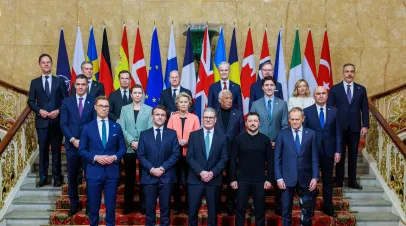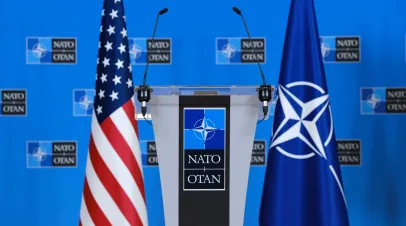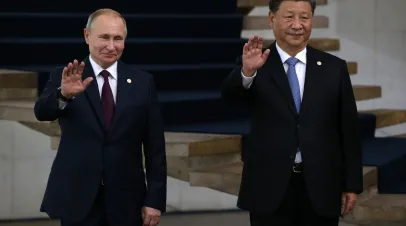Transatlantic Security

Building on GMF’s transatlantic and pan-European footprint, the Transatlantic Security Program leverages GMF’s analytical expertise and convening power to improve European and transatlantic resilience, security, and deterrence and defense.
The program identifies emerging risks, delivers actionable policy recommendations, and forecasts future developments while providing a confidential space for key stakeholders to exchange ideas.
Program priorities
The Transatlantic Security Program identifies key threats and explores how Europe can develop a credible defense posture and maintain a transatlantic link amid a shifting transatlantic dynamic. It analyzes political leadership formats, assesses capability gaps and ways to overcome them, and discusses the future of nuclear deterrence. In doing so, the program contributes to shaping a “transition roadmap” for Europeans to assume greater responsibility for their own security. One research focus is therefore to contribute to a definition of a “European Way of War” as a genuinely European approach to defense and deterrence.
Focusing on the architecture of a durable, European-led security framework, the Transatlantic Security Program analyzes pathways to a sustainable end to the war in Ukraine, a coherent European stance toward a revisionist Russia, and a strengthened cross-theater coordination—from the Arctic to the Indo-Pacific—and across domains such as cyber and space.
The Transatlantic Security Program analyzes geostrategic competition in the Arctic region and its adjacent Atlantic and Pacific theaters. Within this remit, it identifies pathways to strengthen North American and European allies’ posture to protect shared interests, deter aggression, and defend against conventional and hybrid threats while managing escalation risks. The program examines Russian and Chinese objectives, strategies, and military and dual-use capabilities in the region and evaluates their implications for the transatlantic allies. It assesses NATO allies’ capability and posture gaps in the North American and European Arctic and identifies avenues to secure their competitive edge, including through cooperation among international and industry partners. It does so through analysis and by convening solution-oriented dialogues with key experts, as well as public, private, and military stakeholders, to drive policy recommendations.
The Transatlantic Security Program analyzes the challenges that hybrid threats pose for the transatlantic partners. It evaluates the role of hybrid tools in adversary military strategies and tactics, placing a special focus on threats to critical infrastructure and military enablers across the spectrum of conflict. The program assesses the capacity, capability, and posture of NATO allies, EU members, and partners to deter, respond to, and enhance resilience against hybrid threats through national whole-of-government, multilateral, and minilateral approaches. It facilitates strategic dialogues among subject-matter experts and civil, military, and private-sector stakeholders to share best practices for countering hybrid threats; assess their impact on horizontal and vertical escalation dynamics in the context of strategic competition; and shape comprehensive and effective policy responses.



















